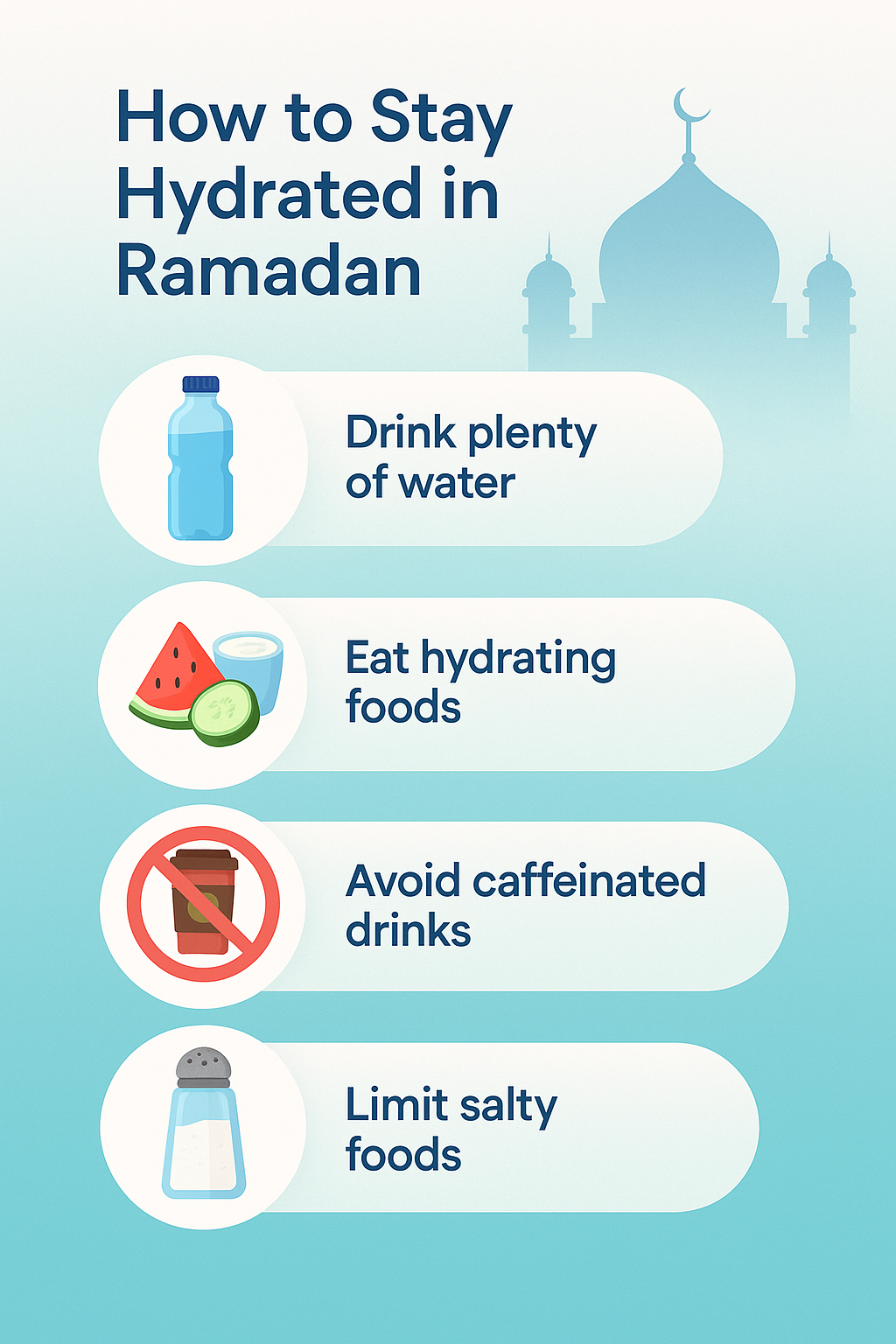How to Stay Hydrated in Ramadan – Best Tips for Fasting
Introduction
Ramadan is a spiritually rewarding month observed by millions of Muslims worldwide. It involves fasting from dawn until sunset, which includes abstaining from both food and drink. While the spiritual benefits are immense, maintaining proper hydration during this time is crucial for your health and energy levels. In Pakistan, where temperatures can soar and fasting hours can be long, dehydration becomes a real risk if hydration isn’t properly managed.
In this blog, we’ll explore smart, practical tips to help you stay hydrated during Ramadan — from the foods you eat to the way you manage your fluid intake between Iftar and Suhoor.
Why Hydration Matters During Fasting
Water is vital for every function in your body. It helps regulate body temperature, supports digestion, transports nutrients, and removes toxins. When you’re fasting, your body still loses water through sweat, urine, and even breathing, but you can’t replenish it until sunset. Even mild dehydration can lead to fatigue, headaches, dry skin, difficulty concentrating, and digestive problems.
That’s why it’s important to approach hydration intentionally during the non-fasting hours.
Smart Hydration Strategy Between Iftar and Suhoor
The key to staying hydrated in Ramadan lies in drinking enough water gradually, not all at once. Here’s a simple plan you can follow:
- Iftar (Sunset Meal): Start with 1–2 glasses of water to rehydrate after the day-long fast.
- Post-Iftar to Taraweeh: Sip water slowly between prayers or snacks.
- Before Bed: Drink another glass to top up hydration.
- Suhoor (Pre-Dawn Meal): Have 2–3 glasses of water before Fajr.
Aim for a minimum of 8–10 glasses of water daily. If you’re active, sweating, or live in a hot climate, you may need more.
Best Foods for Hydration
Food plays a big role in staying hydrated. Some foods naturally contain high water content and help you stay full and refreshed. Include these in your Iftar and Suhoor meals:
- Cucumbers & Tomatoes – High water content and cooling effect
- Watermelon & Melons – Refreshing and hydrating fruits
- Yogurt (Dahi) – Provides water, calcium, and protein
- Soups – Light, flavorful, and hydrating
- Leafy greens – Spinach, lettuce, and herbs add hydration and fiber
These foods not only provide water but also contain electrolytes like potassium and magnesium, which are essential for fluid balance.
Foods & Drinks to Avoid
Not everything you consume in Ramadan supports hydration. Some foods and beverages can actually dehydrate you or make fasting harder:
- Caffeinated drinks like tea, coffee, and colas act as diuretics and increase water loss.
- Fried and salty foods raise your thirst levels and may cause bloating.
- Sugary juices and sodas may seem hydrating, but they cause a quick spike and drop in energy.
Try to keep your meals balanced, wholesome, and low in processed ingredients.
Electrolyte Drinks & Supplements
If you feel especially tired or dehydrated, especially in the summer months, consider taking a sugar-free electrolyte supplement during Iftar or Suhoor. These are designed to replenish minerals lost through sweat and can make a big difference in your energy and hydration levels.
Natural options like coconut water are also good, but drink in moderation to avoid excess sugar.
Hydration Tips for Taraweeh and Evening Hours
Taraweeh prayers can be long and physically tiring. Make sure to:
- Drink small amounts of water between prayer sets.
- Avoid heavy or greasy meals before prayer.
- If needed, carry a water bottle to sip discreetly between breaks.
This ensures you stay fresh and alert through the night without disrupting your hydration schedule.
Suhoor – Your Hydration Lifeline
Many people overlook the importance of Suhoor, but it sets the tone for your day. Choose slow-digesting, hydrating foods like:
- Oats or whole grain roti
- Fruits like banana, apple, or dates
- A glass of milk or water
- Plain yogurt with chia seeds
Avoid salty parathas, spicy chutneys, or dry snacks that increase thirst. Stick to light, moist, and nutritious meals to stay energized throughout your fast.
Bonus Tips for Better Hydration
- Carry a water bottle after Iftar: Remind yourself to sip regularly.
- Set hydration alarms: Gentle reminders between Maghrib and Suhoor can help.
- Eat more fiber: Helps retain water in the digestive system and improves digestion.
- Rest and stay cool: Avoid excessive sweating during the day.
Final Thoughts
Hydration during Ramadan is not just about drinking more water — it’s about drinking it strategically and eating water-rich, nutrient-dense foods. By following the simple tips above, you can protect your body, maintain energy levels, and fully embrace the spiritual benefits of fasting without compromising your health.
Stay mindful. Stay nourished. Stay hydrated.
🔗 Read the full article on how to stay hydrated in Ramadan
Staying hydrated during Ramadan can be challenging due to long hours of fasting and high temperatures, especially in Pakistan. However, with the right approach, you can maintain good hydration and avoid fatigue, headaches, and dizziness while fasting.
Start by drinking plenty of water during non-fasting hours, especially between Iftar and Suhoor. Aim for at least 8–10 glasses of water, and spread it out — don’t drink it all at once. Include hydrating foods like cucumbers, watermelon, and yogurt in your meals. These foods help replenish fluids and provide essential electrolytes.
